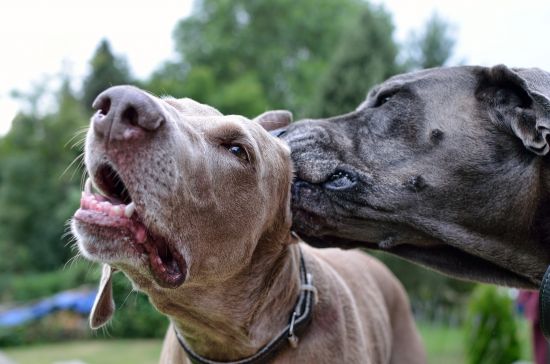Ear infection in dogs — what can you do?
If your dog has an itchy or painful ear, an ear infection may be suspected. You need to act fast because, if left untreated, there can be serious health consequences for your dog. This guide outlines what you can do if your dog has an ear infection, ways to help your dog, and what to do next time to nip any ear infection in the bud.

Floppy ears, prick ears, small or large ears: no canine ears are immune to infection. It is true that certain breeds — such as cocker spaniels, French bulldogs, pug dogs, poodles, or the water-loving labrador retriever — are more prone to ear infections, but other dogs are also commonly afflicted. Dogs have a long, L-shaped ear canal, which offers certain advantages but is also more prone to ailments than the substantially shorter human ear canal.
It is possible for an infection to affect the inner ear (otitis interna) or middle ear (otitis media), but the most common condition in dogs is otitis externa, i.e. inflammation of the outer ear. It is usually easy to detect an ear infection in dogs: the dog will shake its head, rub its paws against its ear, or may even resist being touched at all in this area. Treatment is essential because an ear infection is extremely painful for dogs.

What actually causes an ear infection in dogs?
An ear infection always requires a visit to the vet. This is because there are a variety of possible causes, and identifying the correct treatment is dependent on working out what the problem is.
Fungi, bacteria and mites are common causes of ear infections in dogs, but other triggers include foreign bodies in the ear canal and allergies.
The anatomy of some animals can also mean they suffer from a narrow ear canal, or the inner ear may be poorly ventilated due to thick hair. This makes it easier for infections to develop as a damp, warm environment is an ideal breeding ground for bacteria and fungi.
The metabolism and immune system also sometimes play a role in ear infections: if toxins are not correctly removed or excreted via the liver and kidneys, this can cause a metabolic imbalance. The skin often becomes chapped or rough, circulation is compromised, the immune system is weakened, and inflammation may develop as a consequence.
As you can see, there are a wide range of causes for ear pain in dogs, and a vet’s expertise is required to carefully figure out what the problem is. If left untreated, an ear infection can be very unpleasant! There is a risk of damage to the facial nerve, deafness, injury to the eardrum and impaired balance.
What about treating ear infections yourself with homeopathy or household remedies?
Some people treat earache in pets with globules such as aconite or belladonna. Schuessler salts are also used for earache in dogs. Some swear by the anti-inflammatory properties of coconut oil. A vet that specialises in natural remedies and/or homeopathy is the best source of advice here. At any rate, you should always consult a medical practitioner if your dog is suffering from an ear infection!

Treatment — what will the vet do?
Once the vet has examined your dog (sometimes with the help of a swab) and has identified the inflammation in the ear using an otoscope, there are a range of therapeutic options and remedies available.
Antibiotic and anti-inflammatory ointments, tablets or drops eradicate bacteria or fungi, while other medications can provide relief from pain and itching. The treatment will often include flushing out the ear to clean the ear canal and remove foreign bodies. Treatment might last several days or weeks, depending on the cause of the inflammation.
Chronic ear infections, a severely constricted ear canal, or tumours in the ear may require surgery to alleviate the symptoms. If a metabolic disorder or allergy is the source of the ear infection, the dog’s food will be scrutinised as sometimes a change of food can be helpful.
Ear infections as a sign of food allergy or intolerance
Allergies to substances in the dog’s food are sometimes associated with ear infections. Certain animal proteins are potential triggers for food allergies, for example in sensitive pets. Grains can also come under suspicion as causing intolerances or allergies in some pets. A change of diet to a dog food that contains no allergenic substances can help improve a pet’s symptoms.
Once other causes for an ear infection have been ruled out, you should certainly consider your dog’s food and see what response there is to a change of diet. If a food intolerance or allergy is suspected, you should consult your vet. Only a vet can make a definitive diagnosis and work out what food your dog is allergic to by using a carefully managed exclusion diet.
By the way: particularly in the case of metabolic disorders or a tendency to allergies, it is important to ensure the dog food provides trace elements, minerals and vitamins – this is something to remember in your dog’s diet under any circumstances. A high-quality complete feed that is tailored to your pet’s needs can help avoid any potential nutritional deficits in the first place.
Dog food for sensitive four-legged friends
Preventing ear infections in dogs: tips & tricks
To avoid recurring flare-ups of otitis externa and potentially harmful consequences, the top priority is to find out what is causing the problem. The best preventative strategy requires you to devote regular attention to your dog’s ears:
- Check your dog’s ears once a week for dirt and redness.
- For dogs that are prone to ear infections, regular cleaning is recommended. Your vet will be able to advise you on the best approach.
- Never use cotton buds to clean the ear canal! These can damage the sensitive ear canal and push earwax deeper into the ear! Cleaning is best done carefully using a soft cloth.
- Excessive ear hair should only ever be trimmed by a dog hairdresser.
- Keep the dog’s ears dry, for example by gently drying them off after bathing.
- Switch to a hypoallergenic feed if a food allergy is suspected or choose a product that only contains ingredients that are well tolerated by your dog.
In summary
An ear infection always requires treatment! There are a huge variety of possible causes, and if nothing is done there is the potential for consequential damage. To work out what is causing the problem, you should always consult a vet as soon as possible. A vet can help you investigate the cause — and that will hopefully mean you can be tickling your dog’s healthy ears again in no time!




















